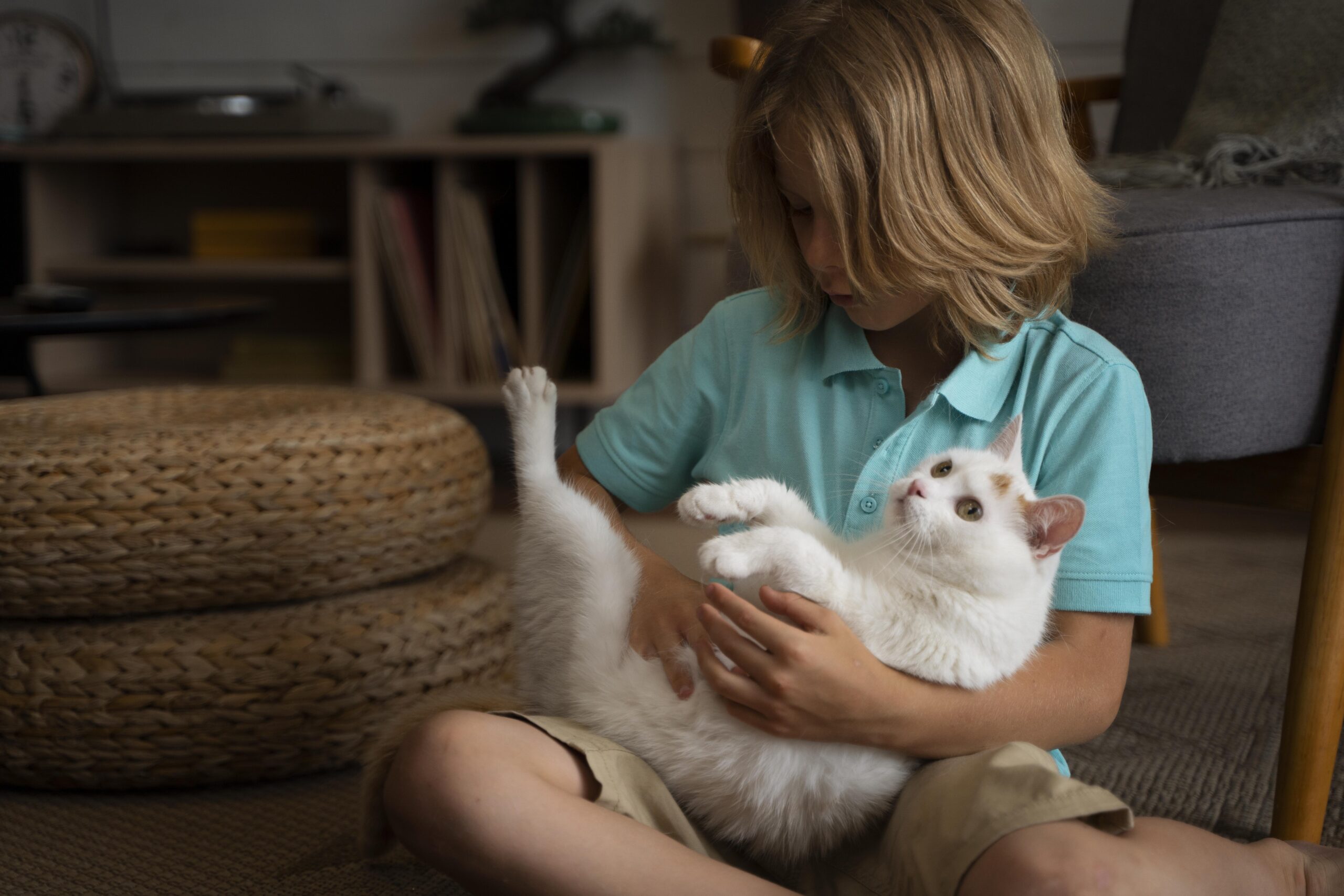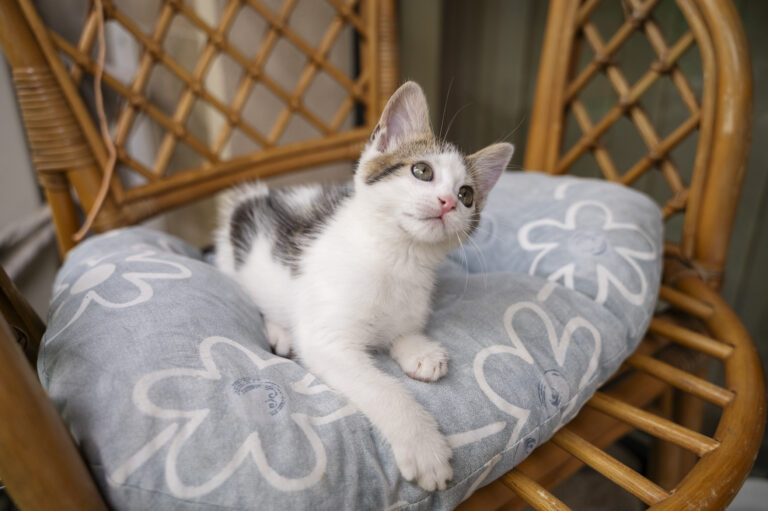How Can I Train My Kitten?

Training a kitten can be a rewarding experience that fosters a strong bond between you and your furry friend. It involves understanding their motivations, using positive reinforcement, and being consistent and patient.
Here’s an expanded Comprehensive Guide to Training Your Kitten, incorporating insights from multiple sources, to help you effectively train your kitten.
Can I Train My Kitten?
How Can I Train My Kitten Effectively? Understanding kitten behavior is the first step. Kittens are naturally curious and energetic.
They learn through association, which means they connect their actions with consequences. Positive reinforcement, where good behavior is rewarded, is more effective than punishment.
This method helps teach desirable behaviors and strengthens the bond between you and your kitten.
Using Treats for Training
1. Choose the Right Treats for kitten Training:
- Identify treats that your kitten loves. This could be small chicken pieces, commercial cat treats, or even certain types of wet food.
- Use these treats to reward good behavior immediately. This helps your kitten make the connection between the behavior and the reward.
2. Training Sessions for kittens:
- Timing: Train your kitten before meals when they are hungry and more likely to be motivated by food.
- Environment: Ensure the training area is free from distractions. A quiet, calm environment will help your kitten focus.
- Duration: To prevent boredom, keep sessions short, around 10-15 minutes.
- Consistency: Use the same commands and signals for each behavior you are trying to teach. This helps your kitten understand what is expected of them.
3. Focus on One Skill at a Time for kitten trainig:
- Master one behavior before moving on to the next. This prevents confusion and makes the training process smoother.
Clicker Training for kittens
How Can I Train My Kitten using a clicker? Clicker training can be particularly effective for cats and kittens. Here’s how it works:
1. How Clicker Training Works:
- Click and Reward: Use a clicker to make a distinct sound when your kitten performs the desired behavior, followed by a treat. This sound acts as a clear signal that they did something right.
- Repetition: Consistently click and reward to build a strong association between the sound and the positive behavior.
2. Benefits of Clicker Training:
- Clicker training can be particularly useful in stressful environments. Studies have shown it helps cats learn positive behaviors faster and can even aid in their adoption from shelters.
Avoiding Punishment during kitten training
1. Negative Associations:
- Punishment is not effective for kittens. Instead, create negative associations with unwanted behaviors. For example, place double-sided tape on surfaces where you want to keep your kitten off. Kittens dislike the sticky feeling, which discourages them from returning.
2. Positive Reinforcement:
- Reward alternative, positive behaviors. For example, if your kitten stops scratching the furniture and uses a scratching post instead, immediately reward them with a treat.
Benefits of Training a kitten
Training provides numerous benefits for both you and your kitten:
- Bonding: Spending time training helps you understand your kitten’s personality and strengthens your bond.
- Mental Stimulation: Training keeps your kitten’s mind active and engaged, which is crucial for their development.
- Behavior Management: Early training helps prevent unwanted behaviors and establishes good habits.
- Health and Longevity: Engaged and well-trained kittens are often happier and healthier.
Practical Tips and Advice for kitten training
1. Create a Safe Training Environment:
- Ensure the area is kitten-proofed, with no dangerous items they can chew or swallow.
2. Use Toys to Redirect Energy:
- Provide plenty of toys to channel your kitten’s natural hunting and positively playing instincts. Cat trees and interactive toys can be very helpful.
3. Be Patient and Flexible:
- Training takes time, and every kitten learns at their own pace. Be patient and adjust your methods if something isn’t working.
4. Reinforce Good Behavior Consistently:
- Always be on the lookout for opportunities to reward good behavior. Consistency is key to effective training.
By following this Comprehensive Guide to Training Your Kitten and being patient and consistent, you can successfully train your kitten to exhibit desirable behaviors and even learn a few tricks. This not only makes life with your kitten more enjoyable but also ensures a happy and healthy relationship with your furry friend.
Whether you are wondering “How Can I Train My Kitten” to stay off counters or hoping to teach them fun tricks, using positive reinforcement and understanding your kitten’s needs will make the process simpler and more enjoyable. Remember, the key to successful training is patience, consistency, and plenty of rewards.
Conclusion
Training your kitten is a rewarding process that requires patience, consistency, and an understanding of feline behavior. By using positive reinforcement techniques, such as treats and clicker training, and creating a safe, distraction-free environment, you can effectively teach your kitten desirable behaviors and even fun tricks.
Remember to avoid punishment and instead focus on creating positive associations with good behaviors. Training sessions should be short, enjoyable, and focused on one skill at a time to prevent confusion. Ultimately, a well-trained kitten is a happier, more engaged pet, which strengthens the bond between you and ensures a harmonious life together.
References:
- American Society for the Prevention of Cruelty to Animals (ASPCA) – Provides guidelines on positive reinforcement training for cats.
- The Humane Society of the United States – Offers tips for clicker training and the benefits of early training.
- International Cat Care – Discuss common kitten behaviors and how to address them.
- PetMD – Details various methods for training kittens and effective use of treats.
- RSPCA (Royal Society for the Prevention of Cruelty to Animals) – Provides insights on cat behavior and training techniques.
- Cats Protection (UK) – A guide on using toys and games to redirect energy positively.
- Jackson Galaxy’s Cat Mojo – Offers advice on clicker training and positive reinforcement.
- VCA Animal Hospitals – Covers the importance of early kitten training and socialization.
- Cat Behavior Associates – Outlines strategies for building trust and training kittens effectively.
- Paws.org – Discusses the importance of mental stimulation and training in kittens.
FAQs
- Can I train my kitten to use the litter box?
- Yes, kittens can be trained to use the litter box by placing them in it after meals and rewarding them for using it properly.
- How do I stop my kitten from biting?
- Redirect biting behavior with toys and avoid using your hands as playthings to discourage biting.
- What is the best age to start training my kitten?
- Start training as early as 8 weeks old. Younger kittens are more receptive to learning and establishing good habits.
- Can I use human food as treats for training?
- Yes, but ensure the food is safe for cats. Small pieces of cooked chicken or fish are often good options.
- How long should each training session last?
- Keep sessions short, around 10-15 minutes, to prevent boredom and maintain your kitten’s interest.
- What if my kitten doesn’t respond to training?
- Be patient and consistent. Adjust your methods if necessary, and consult a professional if needed.
- Can I train my kitten to come when called?
- Yes, use treats and a consistent cue, like their name or a clicker, to train them to come to you.
- Should I punish my kitten for bad behavior?
- No, punishment can create fear and anxiety. Instead, focus on positive reinforcement to encourage good behavior.
- How do I teach my kitten to stay off counters?
- Use double-sided tape or motion-activated deterrents, and reward them when they choose an appropriate alternative, like a cat tree.
- Is clicker training effective for all kittens?
- Yes, clicker training is generally effective as it clearly signals the desired behavior, but patience and repetition are key.







